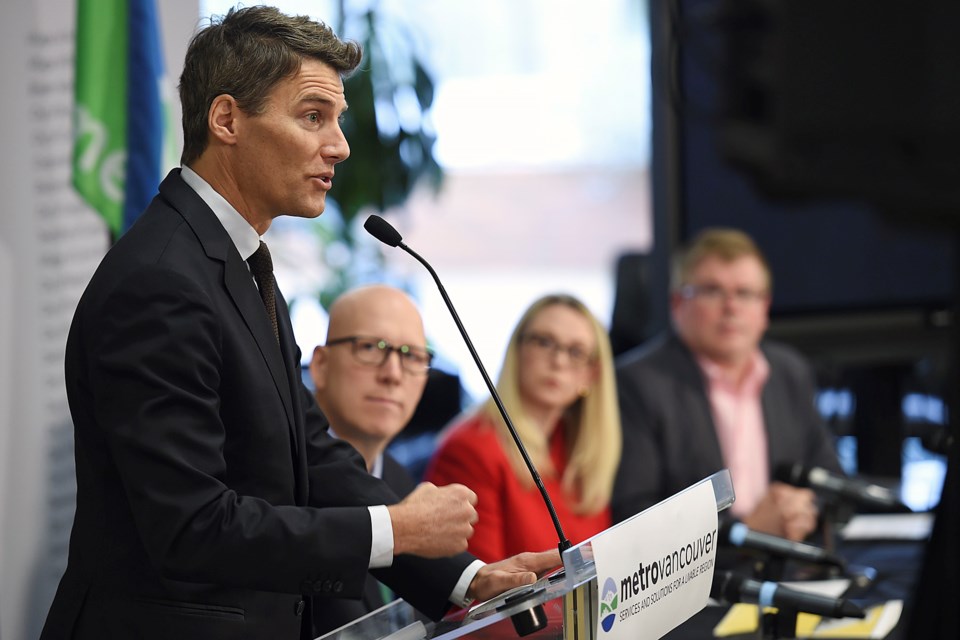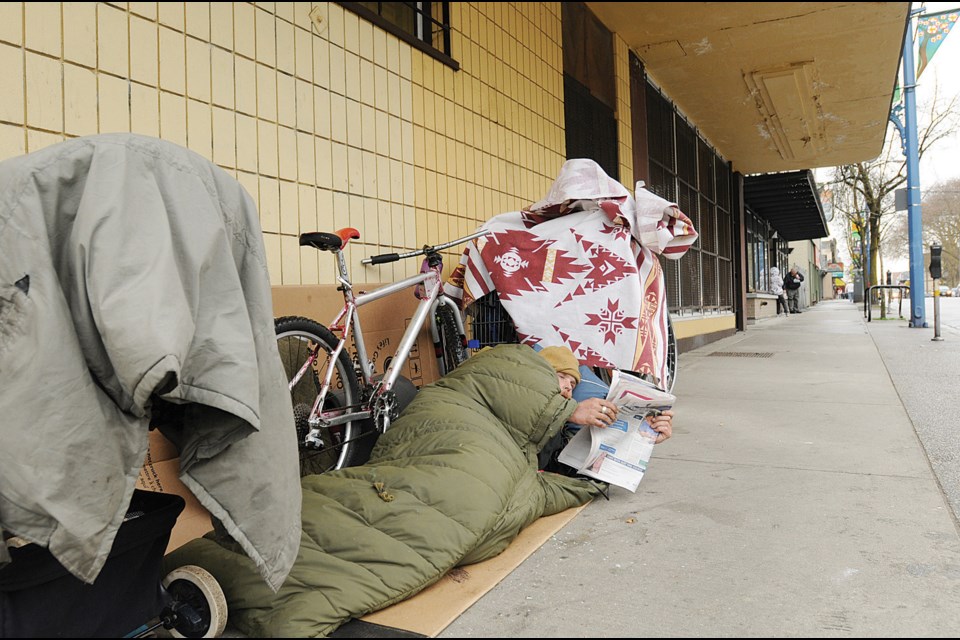Four of the region’s mayors issued a damning report Monday on the state of homelessness in Metro Vancouver that was aimed at the provincial government for what they say is an inadequate response to getting people off the street and into housing.
With more than 70 homeless camps in the region, the mayors estimated 4,000 people are in need of a home in Metro Vancouver. They said shelters are at 97 per cent capacity and approximately five people per week are becoming homeless in the region. Another 10,000 people are on B.C. Housing’s waiting list for a permanent home.
“Metro Vancouver is in an unprecedented homeless crisis,” said Mayor Gregor Robertson, co-chairperson of the Metro Vancouver Regional Homelessness Task Force, who joined the mayors of Port Coquitlam, Port Moody and Maple Ridge at a news conference in Burnaby.
The report – or “position paper” as the mayors have called it – makes 12 recommendations, including building 3,000 units of transitional housing by 2019, increasing the $375 shelter rate for welfare recipients, adding services for Aboriginal peoples, creating a plan to tackle poverty and expanding home care for chronic health issues, mental illness and addictions.

The homeless count conducted in Vancouver in March 2016 revealed a homeless population of 1,847 people, the largest in the city’s history. Vancouver will participate next week in a region-wide homeless count and the mayors are expecting the results will show homelessness is getting worse.
“This is a crisis that is moving in the wrong direction,” said Maple Ridge Mayor Nicole Read. “We have no plan here in the province of British Columbia to address homelessness, and local governments are scrambling to do their best – with no resources, no funding to be able to deal with the citizens on their streets who need care.”
Metro’s 2014 homeless count revealed 84 people were homeless in Maple Ridge and Pitt Meadows. The count was done before a homeless camp was emerged in Maple Ridge. Over time, Read added, people who can’t find a home at the $375 per month shelter rate, or lose a home, fall into “a cycle of shame.”
“We end up with people who are afraid to even go into housing, who would prefer to live in a tent on a street, or in a bush, than try again -- and that is deplorable, and we are Canadians and we can do better,” Read said.
The mayors pointed out that a Simon Fraser University study showed the cost to taxpayers to support a homeless person is $55,000 annually. That cost, which totals $200 million for the region, includes setting up shelters, drop-in centres, outreach services, food banks and policing costs. The same study showed it costs $37,000 annually when that same person is housed and given support services such as treatment and counselling.
Though Robertson acknowledged he promised to end “street homelessness” in Vancouver by 2015, he noted that promise was made with the understanding that senior levels of government would also respond to the crisis in the streets. He accused those governments of “dropping the ball" and waging "a war on the poor."
“We have had some partnerships, certainly in Vancouver and across the region, with the provincial government over the years but they’re nowhere near the need to deal with the increase of homelessness,” he said, noting in his first three years as mayor the street homeless population dropped from more than 800 to under 150. “In 2011, things turned and Christy Clark became the premier of B.C. There was no commitment to solving homelessness here in the province, there was very little follow-through.”
In the past decade, the provincial government funded 13 supportive housing sites in Vancouver that created more than 1,500 units across the city. The government also bought and renovated more than 25 single-room-occupancy hotels in Vancouver, funded temporary housing sites and continues to offer rent supplements to low-income people.
Housing Minister Rich Coleman told reporters Monday that he was “flabbergasted” by Robertson’s comments. Coleman said the government has spent “hundreds of millions of dollars” in Vancouver and done more than any jurisdiction in Canada on housing. He said the mayor was politicizing homelessness.
“[Robertson] shows up at the opening of these places, so he knows we continue to do it,” the minister said. “We spend over $200 million a year just on operating costs in Vancouver. We take care of over 27,500 people in their homes and support them in the marketplace. But in addition to that, we’ve built shelters, we’ve put in outreach workers, we continue to work very hard on this file. And for him to go out and say otherwise, it’s totally not true. I’m sad, I’m actually sad.”
Robertson said the provincial government has refused to fund a second phase of a social housing building program, which saw the city donate its land for the 13 buildings and the Streetohome Foundation also contribute to some of the costs.
When asked if he or the other mayors can take any responsibility for homelessness in their communities, Robertson and Read said housing and health care are primarily provincial government responsibilities. Yet, both mayors said, they have spent taxpayers’ dollars on reaching out to homeless people, including opening shelters and funding a youth mental wellness facility.
mhowell@vancourier.com
@Howellings



